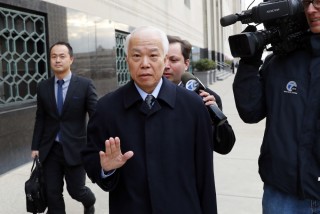Loading
Search
▼ Takata Pleads Guilty in U.S. Over Airbags
- Category:Other
DETROIT (AP) — Japanese auto parts maker Takata Corp. pleaded guilty to fraud Monday and agreed to pay $1 billion in penalties for concealing an airbag defect blamed for at least 16 deaths, most of them in the United States.
The scandal, meanwhile, seemed to grow wider when plaintiffs’ attorneys charged that five major automakers knew the devices were dangerous but continued to use them for years to save money.
In pleading guilty, Takata admitted hiding evidence that millions of its airbag inflators can explode with too much force, hurling lethal shrapnel into drivers and passengers. Chief Financial Officer Yoichiro Nomura spoke on behalf of the Tokyo-based company, saying the conduct was “completely unacceptable.”
The inflators are blamed for 11 deaths in the U.S. alone and more than 180 injuries worldwide. The problem touched off the biggest recall in U.S. automotive history, involving 42 million vehicles and up to 69 million inflators.
Penalties in the criminal case include $850 million in restitution to automakers, $125 million for victims and $25 million for the U.S. government. Takata’s fine to the government could have been as much as $1.5 billion, but the judge in the case said such a sum probably would put the company out of business.
While Takata’s destruction “would probably be a fair outcome,” it wouldn’t help victims get paid, U.S. District Judge George Caram Steeh said in accepting the deal negotiated with the U.S. Justice Department.
Takata’s penalty is small compared with the one imposed on Volkswagen, which must buy back cars and pay up to $21 billion over its emissions-cheating scandal. Steeh said he would pick a person to administer the restitution funds this week. Kenneth Feinberg, who handled the General Motors ignition switch and BP Oil spill compensation funds, is being considered.
Takata’s inflators use ammonium nitrate to create a small explosion that inflates airbags in a crash. But when exposed to prolonged high temperatures and humidity, the chemical can deteriorate and burn too fast. That can blow apart a metal canister.
In the U.S., 19 automakers are recalling inflators. Worldwide, the total number is over 100 million.
Takata is “fully committed to ensuring that such conditions never happen again,” Nomura said.
The costs of the recalls have saddled Takata, which also makes seat belts, with two straight years of losses. Lawyers acknowledged in court that the company will have to be sold to fund the agreement. Separately, three former executives are charged with falsifying test reports. They remain in Japan.
The scandal, meanwhile, seemed to grow wider when plaintiffs’ attorneys charged that five major automakers knew the devices were dangerous but continued to use them for years to save money.
In pleading guilty, Takata admitted hiding evidence that millions of its airbag inflators can explode with too much force, hurling lethal shrapnel into drivers and passengers. Chief Financial Officer Yoichiro Nomura spoke on behalf of the Tokyo-based company, saying the conduct was “completely unacceptable.”
The inflators are blamed for 11 deaths in the U.S. alone and more than 180 injuries worldwide. The problem touched off the biggest recall in U.S. automotive history, involving 42 million vehicles and up to 69 million inflators.
Penalties in the criminal case include $850 million in restitution to automakers, $125 million for victims and $25 million for the U.S. government. Takata’s fine to the government could have been as much as $1.5 billion, but the judge in the case said such a sum probably would put the company out of business.
While Takata’s destruction “would probably be a fair outcome,” it wouldn’t help victims get paid, U.S. District Judge George Caram Steeh said in accepting the deal negotiated with the U.S. Justice Department.
Takata’s penalty is small compared with the one imposed on Volkswagen, which must buy back cars and pay up to $21 billion over its emissions-cheating scandal. Steeh said he would pick a person to administer the restitution funds this week. Kenneth Feinberg, who handled the General Motors ignition switch and BP Oil spill compensation funds, is being considered.
Takata’s inflators use ammonium nitrate to create a small explosion that inflates airbags in a crash. But when exposed to prolonged high temperatures and humidity, the chemical can deteriorate and burn too fast. That can blow apart a metal canister.
In the U.S., 19 automakers are recalling inflators. Worldwide, the total number is over 100 million.
Takata is “fully committed to ensuring that such conditions never happen again,” Nomura said.
The costs of the recalls have saddled Takata, which also makes seat belts, with two straight years of losses. Lawyers acknowledged in court that the company will have to be sold to fund the agreement. Separately, three former executives are charged with falsifying test reports. They remain in Japan.
- March 4, 2017
- Comment (0)
- Trackback(0)


